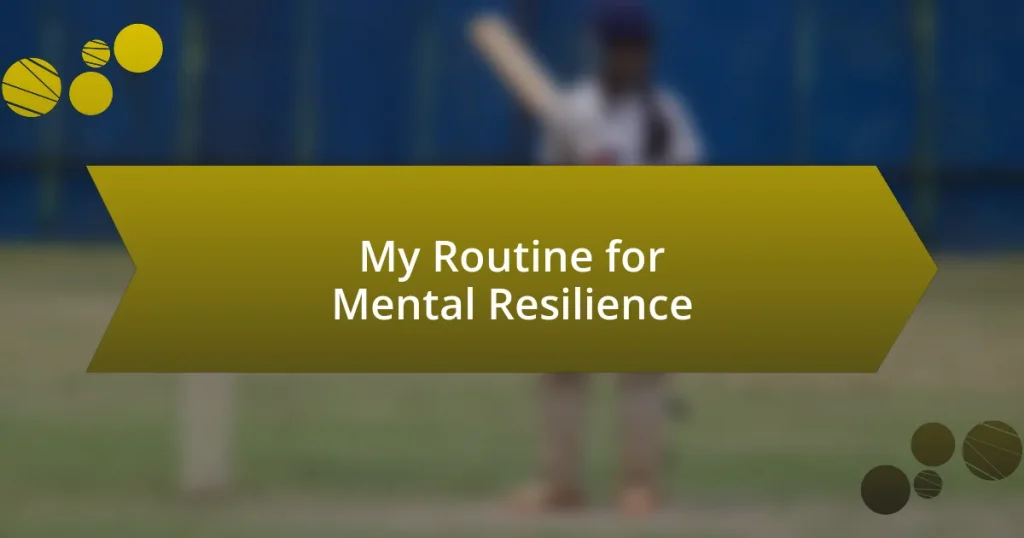Key takeaways:
- Mental resilience involves embracing stress and using coping strategies, such as journaling, to foster growth and perspective shift.
- Establishing daily routines enhances mental resilience by providing stability, reducing anxiety, and promoting self-care.
- Incorporating mindful practices, like gratitude journaling and mindful walking, can transform daily stress management and improve focus.
- Regularly evaluating and adjusting routines is essential for aligning them with mental resilience goals and fostering self-compassion.
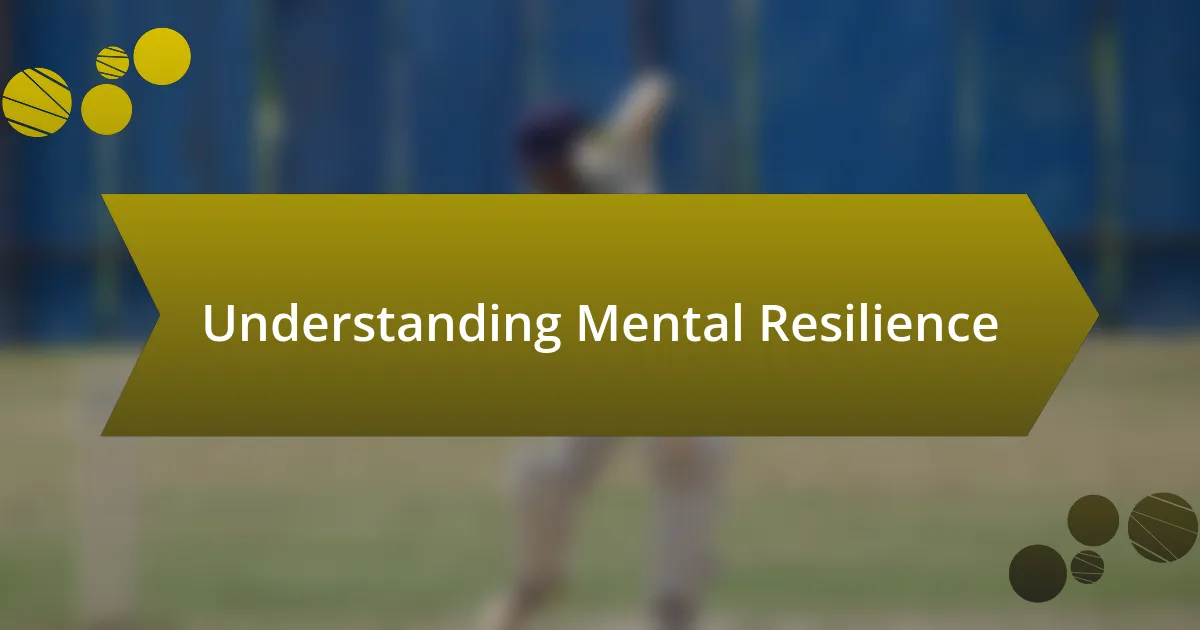
Understanding Mental Resilience
Mental resilience is the ability to adapt and bounce back from life’s challenges, something I’ve learned through my own experiences. When I faced a particularly tough period, I realized that resilience isn’t about avoiding stress but embracing it to foster growth. How many times have we found ourselves stronger after overcoming difficulties?
It’s fascinating how mental resilience combines emotional awareness and coping strategies. For me, journaling has been a key practice; it helps me process my thoughts and feelings in a way that promotes clarity and calm. I often reflect, does facing my emotions head-on give me strength, or is it merely a step toward understanding myself better?
In tough moments, resilience feels like a muscle that gets stronger with use. I’ve observed this in my reaction to setbacks—initially, I would dwell on what went wrong, but now I try to reframe the experience as a learning opportunity. Isn’t it intriguing how shifting our perspective can turn perceived failures into stepping stones for future success?

Importance of Daily Routines
Establishing a daily routine is essential for nurturing mental resilience. In my experience, a structured day helps reduce anxiety by creating predictability. There was a time when I struggled with fluctuating moods, and developing a consistent routine was a game-changer. It gave me an anchor during turbulent times, transforming chaos into manageable segments.
Consider these benefits of daily routines:
- They provide a sense of stability and control, reducing uncertainty.
- Routines help in setting and achieving goals, big or small.
- They foster healthy habits, such as regular exercise and mindful eating.
- A structured day can enhance focus and productivity, paving the way for success.
By implementing a routine, I’ve learned to prioritize not just tasks but also self-care, reinforcing the foundation of my mental resilience.
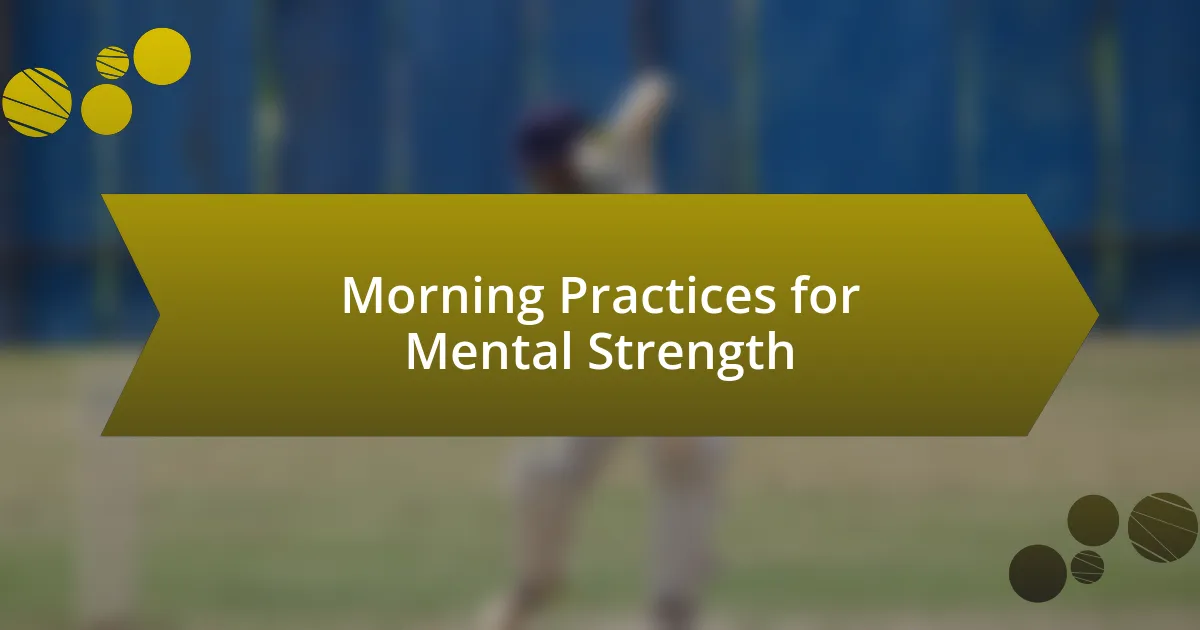
Morning Practices for Mental Strength
Morning practices are crucial for building and maintaining mental strength. One practice I’ve found incredibly beneficial is starting my day with gratitude journaling. Each morning, I take a few minutes to jot down three things I’m thankful for. This simple act helps shift my focus from worries and anxieties to a more positive mindset, setting the tone for the day ahead.
Another practice that deeply resonates with me is meditation. I remember a time when my mind felt like a chaotic whirlwind, making it hard to concentrate. Dedicating just ten minutes to meditate in the morning has grounded me, allowing me to center my thoughts. It’s surprising how this quiet time can create such a powerful shift in my mental clarity and emotional resilience.
Lastly, I always incorporate physical movement into my morning routine. Whether it’s a brisk walk or a few minutes of stretching, getting my body moving lifts my spirits and energizes my mind. I’ve noticed that those days when I skip this practice often feel sluggish and unfocused. Our bodies and minds are intertwined; nurturing both is key to building mental strength.
| Morning Practice | Benefits |
|---|---|
| Gratitude Journaling | Shifts focus to positivity, reduces anxiety |
| Meditation | Enhances mental clarity, promotes emotional stability |
| Physical Movement | Boosts energy, improves mood |
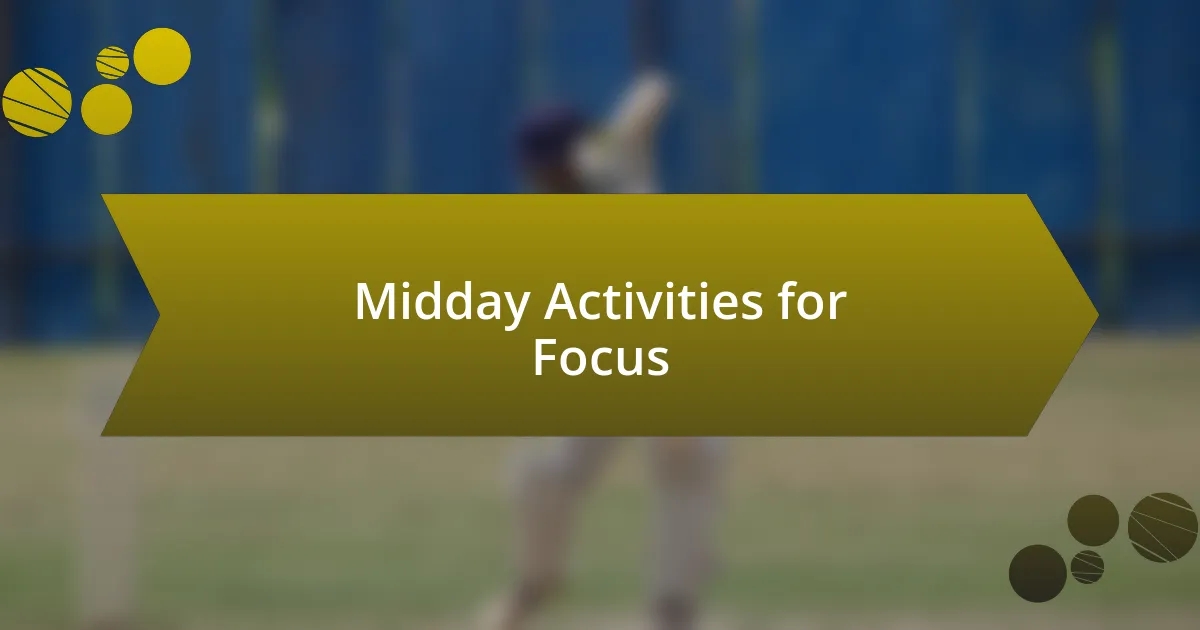
Midday Activities for Focus
Nothing breaks up my workday like a purposeful midday break. Recently, I started stepping away from my desk for a brisk walk outdoors, and I can’t emphasize enough how transformative it has been for my focus. The fresh air and the change of scenery act like a reset button, clearing my mind and revitalizing my energy. Have you ever noticed how stepping outside can shift your perspective in just a few minutes?
Incorporating a mini mindfulness session mid-afternoon is another powerhouse activity for me. I take about five minutes to practice mindful breathing, focusing solely on my breath. Those moments feel like a retreat from the bustle of the day, allowing me to regain my mental clarity. The calm that washes over me during this time reminds me just how vital it is to pause and reconnect with myself.
Additionally, I find that engaging in a creative task, like sketching or writing, invigorates my mind in ways I didn’t expect. I often fill a few minutes with drawings or doodles, turning off my analytical mind and allowing my thoughts to flow freely. This spontaneity brings a sense of joy and focus that often spills over into my next work task, reminding me how crucial creative outlets are for fostering concentration. Have you explored how creativity impacts your focus during the day?

Evening Habits for Reflection
In the evenings, I prioritize a winding-down ritual that centers around reflection. I often sit with a journal, jotting down thoughts from my day. It’s surprising how much clarity this simple act provides; it’s like holding up a mirror to my experiences. Have you ever tried writing down your feelings before bed? It can reveal insights you might have overlooked.
Another practice I cherish is a mindfulness meditation session. After a busy day, I find a quiet spot and dedicate ten minutes to deep breathing and visualizing my day’s events. This calming process allows me to unpack my emotions and learn from my reactions. I often emerge with a greater understanding of myself—like peeling back layers to reveal what’s beneath.
I also love to create a comforting atmosphere by sipping herbal tea while I reflect. The warmth of the tea in my hands seems to enhance my ability to process thoughts. As I sip, I often ask myself, “What did I learn today?” This question has become a profound touchstone in my routine, guiding me toward continuous growth. What about you—do you have a favorite evening habit that encourages you to reflect?
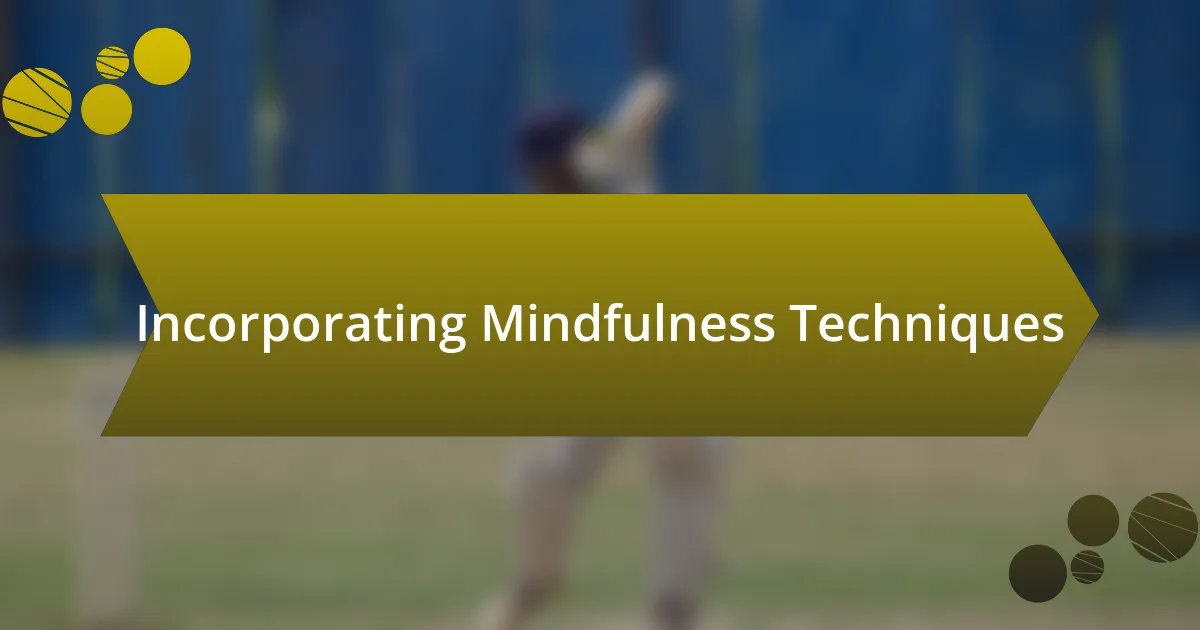
Incorporating Mindfulness Techniques
Incorporating mindfulness techniques has truly transformed my approach to daily stress. I often start my mornings with a short guided meditation that focuses on gratitude. This practice helps me set a positive tone for the day, reminding me of what truly matters and grounding me amidst life’s chaos. Have you ever noticed how starting with appreciation can shift your entire perspective?
Another effective mindfulness technique I’ve embraced is mindful walking. During my lunch breaks, I step outside and intentionally focus on my surroundings—the rustling leaves, the warmth of the sunlight, and the rhythm of my steps. It’s amazing how this simple act can quiet the mind, allowing for clarity and peace to seep in. I often find myself returning to my desk feeling recharged, ready to tackle the rest of the day.
Listening to calming music with full attention is another practice I cherish. I choose playlists that resonate with my mood and let myself be absorbed in the melodies, paying attention to each note and instrument. This immersion creates a soothing escape, allowing my mind to reset. Have you tried making music a part of your mindfulness journey? It can open up emotional channels and offer unexpected relief.

Evaluating and Adjusting Your Routine
Evaluating your routine is vital to ensure it aligns with your mental resilience goals. I remember when I realized that my old evening routine, which included mindlessly scrolling through my phone, was draining rather than rejuvenating. By taking a step back and assessing how I felt after each activity, I could replace that scrolling with reading or journaling—practices that truly uplifted my spirit.
Adjustments become easier when I embrace flexibility. There are days I wake up feeling overwhelmed, and sticking to my usual structured routine only raises my anxiety. Instead, I’ve learned to adapt by allowing myself to shift gears, maybe opting for a shorter meditation session or a quiet cup of tea instead of my typical exercise routine. How often do we give ourselves permission to adjust? Taking that step to listen to our needs is a unique gift.
Moreover, checking in with myself regularly is an essential part of refining my routine. I like to schedule a weekly reflection, where I evaluate what worked and what didn’t. This exercise not only helps me pinpoint areas for change but also fosters self-compassion. After all, building mental resilience is about progress, not perfection—what adjustments can you envision making in your own journey?










